When Google Changes Page Titles
As most webmasters are aware, the text put within a page’s <TITLE> tags appears in two places – at the top of the browser window when a user is viewing a page, and it appears as the link anchor text on Google’s and other search engine results pages. But there are some rare occasions when Google will display different link text on their result pages than what is used in the <TITLE> text. So, why is this happening, and could it be happening to you?
I was recently researching some problems that a client was exeriencing due to bad advice given to him by a prior SEO agency (they’d encouraged him to buy links and participate in link exchanges, I found, among other sins). While looking into the site’s problems which included various over-optimizations and bad usability design, I discovered that when I used a particular keyword to search in Google, his site’s homepage came up with a completely different title in the search results. Most of his other desired keywords brought up his HTML <TITLE> text like normal, but this one did not…
Now, I already knew from Matt Cutts that Google sometimes changes the title and snippet text, but to my knowledge neither Matt nor other Googlers have ever documented for us the actual instances where this can be invoked. From looking at Matt Cutt’s post on the matter, I think Google’s algorithm has likely even changed slightly, where this is concerned. I’ve found one case where this can apparently be called reproduceably, so I thought I’d share.
So, what was the mysterious keyword sequence that caused this client’s site to abruptly appear with its DMOZ.org title, instead of the native one? This seemed to happen only when search terms were used that closely matched the client’s brand name.
You see, the earlier SEOs which had advised him had overdone it to the point where they’d removed his brand name from his title entirely, perhaps on the theory that it was undesirably inert material that should be thrown out to make room for more advantageous terms. Yet, his brand name matched his domain name fairly closely.
My theory is this: Google has decided that when a user types a search keyword that closely matches a brand name /domain name of a site, it’s possibly quite likely that the user actually desires to find that very site. The problem is that the site is so very badly designed that the brandname may not be reflected in the title tag, or perhaps the brand is located way at the end of a long title — so long that it would get snipped off prior to display in Google’s SERPs, or the user might miss the name located way off to the rightside. If the user doesn’t see the brand name in the SERPs, they might miss the very site they’re seeking — so I believe Google has found this to be a bad user experience, and found a way to rectify the prob in many cases by using DMOZ’s title for the site.
Aside from my client (who shall remain nameless), I found a few different sites which have this same situation going on:
Brand name / Domain name:
Reuters / www.reuters.com
DMOZ title: Reuters
HTML title: <title>Breaking News, World, U.S., Video, Investing and Business News & More | Reuters.com</title>
Google listing when searching for “reuters”:
Brand name / Domain name:
United States Small Business Administration (or “SBA“) / www.sba.gov
DMOZ title: United States Small Business Administration
HTML title: <title></title>
Google listing when searching for “small business administration” or “sba”:
Brand name / Domain name:
Sneaker World / www.sneakerworld.com
DMOZ title: Sneaker World
HTML title: <title>Discount Sneakers, Custom Apparel, and Custom Embroidery</title>
Google listing when searching for “sneaker world”:
Brand name / Domain name:
Mr.Tones / www.mrtones.com
DMOZ title: Mr.Tones
HTML title: <TITLE>Free Ringtones – Polyphonic Ringtones – Logos – Picture Msgs – Mobile Wallpapers – Mr.Tones</TITLE>
Google listing when searching for “mr. tones”:
Brand name / Domain name:
AccessoryGeeks / www.accessorygeeks.com
DMOZ title: AccessoryGeeks
HTML title: <title>Cell Phone Accessories, Mobile Phone Accessories, Wireless Phone Accessories</title>
Google listing when searching for “accessory geeks”:
Brand name / Domain name:
Best Buy Pool Supply / www.bestbuypoolsupply.com
DMOZ title: Best Buy Pool Supply
HTML title: <title>Pool Supplies, Pool Cleaners, Pool Heaters, Pool Pumps, Pool Filters – Pool Supplies Discounted</title>
Google listing when searching for “best buy pool supply”:
Aside from the takeaway that this may explain when/why Google chooses to display alternative TITLE/snippet treatment for a page when it appears in the SERPs, I think this is an indicator that as a part of good usability, Google has found that it’s desirable for good user-experience to display the brand name in the title. If so, the obverse might hold true as well: it’s perhaps a bad user-experience to neglect to have the brand name appear in the title, particularly on homepages. If one of Google’s many signals is the nebulous “quality score” of a page, then neglecting to have the brandname in the title might actually count a bit against a site.
Now, as Matt Cutts and the Google Webmaster Tools team have explained, you can control whether they revert to the DMOZ content by setting the NOODP meta tag on your page. But, don’t you want to perhaps first make adjustments on your native site to correct for the usability/user-experience issue that Google has apparently identified which invoked this treatment in the first place? To ensure a good user-experience (not to mention, to solidify your basic marketing work!), you should include the brand name or site name within the HTML TITLE text, and you shouldn’t push it so far to the right side that users will be unlikely to see it if they’re scanning a SERP.
Sure, you can have a few of your site’s main keywords which help outline what the site is all about, but leaving your brand name completely out makes you harder to find by users, can make your site appear to be of less quality, and may actually make it appear a tad fishy to Google.
Possible Related Posts
Posted by Chris of Silvery on 06/12/2007
Permalink | |  Print
| Trackback | Comments Off on When Google Changes Page Titles | Comments RSS
Print
| Trackback | Comments Off on When Google Changes Page Titles | Comments RSS
Filed under: Content Optimization, Google, HTML Optimization, Search Engine Optimization, SEO DMOZ, Google, html-title, html-title-tag, Open-Directory-Project, page-titles, Search Engine Optimization, SEO, SERP-display

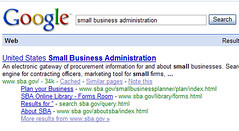
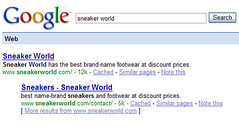
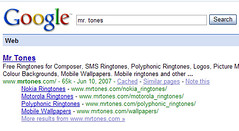
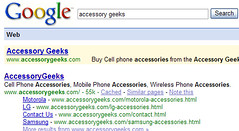
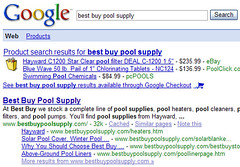


No comments for When Google Changes Page Titles
No comments yet.
Sorry, the comment form is closed at this time.